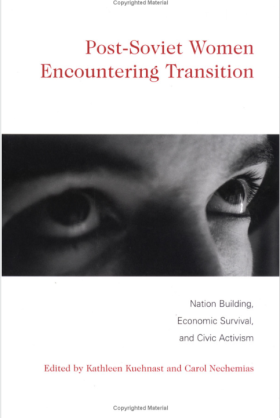Post-Soviet Women Encountering Transition: Nation-Building, Economic Survival, and Civic Activism

-
Women in the former Soviet Union, despite a legacy of high levels of education and labor force participation, face a host of new problems, according to editors Kathleen Kuehnast and Carol Nechemias. Neo-familialist ideologies have arisen, with a longing for the return of traditional families. A gendered division of labor in the market economy has pushed women to the bottom of the pyramid of small businesses as bazaar merchants. And in the political arena, men dominate formal government structures and political parties, while women dominate the realm of non-governmental organizations.
Post-Soviet Women Encountering Transition studies these problems through a series of essays by social scientists from the United States, Europe, and the former Soviet Union, going beyond coverage of Russia and ethnic Russians to treat Armenia, Azerbaijan, Belarus, Kazakhstan, Ukraine, Uzbekistan, and the Tatar and Sakha Republics of Russia.
Through anthropology, political science, and other disciplines, the contributors examine women’s role in nation-building, rural household economies, and democratization and civic activism. A final set of essays studies the interaction of post-Soviet women with Western aid organizations, which often pursue strategies not consonant with the situations and expressed desires of the women they are trying to help.
Contributors: David Abramson, Andrea Berg, Susan Crate, Elena Gapova, Katherine Graney, Julie Hemment, Armine Ishkanian, Janet Johnson, Rebecca Kay, Ludmila Popkova, Michele Rivkin-Fish, Nayereh Tohidi, Cynthia Werner, and Tatiana Zhurzhenko.
Kathleen Kuehnast is a research associate at George Washington University, and Carol Nechemias is an associate professor of public policy at Pennsylvania State University, Harrisburg.
Editors
Kathleen KuehnastFormer Research Grant;
, Social Development Department, The World BankBrowse Insights & AnalysisExplore More
Browse Insights & Analysis
Iraq Should Consider Extending UNAMI’s Mission
Posted date/time:
Middle East Dialogue February 2025 Meeting Report
Posted date/time:

